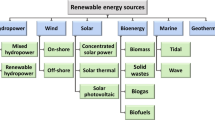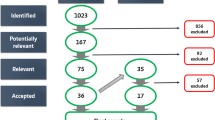Abstract
There is now widespread agreement that, in the interest of energy conservation and substitution of oil, consumer prices for energy should reflect world market prices while taking account of longer-term trends. Are the energy policies of the major industrialised countries in conformity with this demand?
Similar content being viewed by others
References
Cf. the Annex to the Resolution of the Council of Ministers of the European Communities of 9th June 1980, in: Official Journal of the European Communities No. C 149 of 18.6.1980, and the Communiqué of the Meeting of Ministers of the IEA of 15th June 1981.
Cf. Report of the NEDC Energy Task Force, London, February and November 1981.
Cf. in this connection the proposal of the Board of Experts (Sachverständigenrat) in the Annual Assessment for 1979/80, Bundestagsdrucksache 8/3420, paragraphs 437 ff.
Cf. IEA: Energy Policies and Programmes of IEA Countries, 1981 Review, Paris 1982, p. 146.
Cf. Commission of the European Communities: The Community Coal Market in 1981 and the Outlook for 1982, in: Official Journal of the European Communities No. C 131 of 24. 5. 1982, Table 16.
Estimated on the basis of the NEDC Report of November 1981, op. cit., the Annual Reports of Charbonnages de France and the UK National Coal Board and press reports.
In the United Kingdom 1% of industrial users of gas account for 70% of industry's total gas consumption for energy purposes. Cf. NEDC, November 1981, op. cit. the Annual Reports of Charbonnages de France and the UK National Coal Board and press reports, p. 13.
Cf. OECD: Economic Outlook 29, Paris, July 1981, Table 24, p. 27.
Cf. IMF: World Economic Outlook, Washington, D.C., June 1981, p. 148.
Cf. IEA: World Energy Outlook, Paris 1982, p. 81.
Cf. for EC countries: Commission of the European Communities: Energy Pricing-Policy and Transparency, Brussels, October 1981, and the Commission Oil Bulletin; for the other countries: International Petroleum Annual; Statistical Abstract of the USA 1981; DOE: Monthly Energy Review; IEA: Energy prices in the third quarter of 1982, Paris, December 1982.
IEA: World Energy Outlook, op. cit., Paris 1982, p. 85.
Ibid., IEA: World Energy Outlook, Paris 1982, p. 86.
Cf. OECD: Economic Outlook 30, Paris, December 1981, p. 52.
Cf. the remarks of the Council of Ministers of the European Communities of December 1981, quoted in: Commission of the European Communities: Energy Pricing: Developments in Community Policy for 1981–82, Brussels, October 1982.
see: Bundestagsdrucksache 9/2118, paragraph 270.
Cf. Rom will Ölpreiseinsparungen abschöpfen, in: Frankfurter Allgemeine of 15. 3. 1983.
Author information
Authors and Affiliations
Rights and permissions
About this article
Cite this article
Matthies, K. Government influence on energy prices. Intereconomics 18, 90–96 (1983). https://doi.org/10.1007/BF02928491
Issue Date:
DOI: https://doi.org/10.1007/BF02928491




